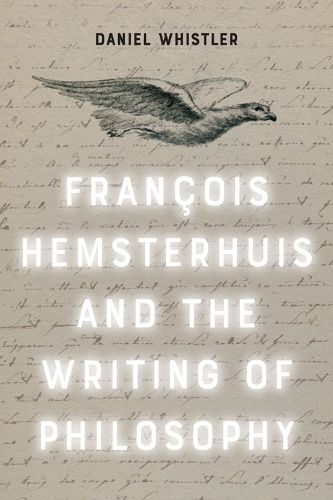Readings Newsletter
Become a Readings Member to make your shopping experience even easier.
Sign in or sign up for free!
You’re not far away from qualifying for FREE standard shipping within Australia
You’ve qualified for FREE standard shipping within Australia
The cart is loading…






Resets the scholarship on the philosophical practice and style of Francois HemsterhuisFrancois Hemsterhuis, 1721-1790, was the most significant Dutch philosopher after Spinoza. Daniel Whistler argues that Hemsterhuis’ philosophy matters and that its exclusion from the canon of modern philosophy has been unjust. This is not just because of its influence on later German thinkers, such as Goethe, Hegel, Herder, Jacobi, Lessing and Novalis - but primarily because Hemsterhuis’ philosophy contains such a rich assemblage of ideas and philosophical practices. Whistler looks specifically at Hemsterhuis’ reflections on philosophical style and the strategies he employs to communicate and disclose ideas in his late dialogues. Taking seriously Hemsterhuis’ newly-published complete correspondence as a significant philosophical text, he contends that Hemsterhuis deserves to be placed alongside Schlegel, Kierkegaard and Nietzsche as one of the preeminent philosophical stylists of modernity.
$9.00 standard shipping within Australia
FREE standard shipping within Australia for orders over $100.00
Express & International shipping calculated at checkout
Resets the scholarship on the philosophical practice and style of Francois HemsterhuisFrancois Hemsterhuis, 1721-1790, was the most significant Dutch philosopher after Spinoza. Daniel Whistler argues that Hemsterhuis’ philosophy matters and that its exclusion from the canon of modern philosophy has been unjust. This is not just because of its influence on later German thinkers, such as Goethe, Hegel, Herder, Jacobi, Lessing and Novalis - but primarily because Hemsterhuis’ philosophy contains such a rich assemblage of ideas and philosophical practices. Whistler looks specifically at Hemsterhuis’ reflections on philosophical style and the strategies he employs to communicate and disclose ideas in his late dialogues. Taking seriously Hemsterhuis’ newly-published complete correspondence as a significant philosophical text, he contends that Hemsterhuis deserves to be placed alongside Schlegel, Kierkegaard and Nietzsche as one of the preeminent philosophical stylists of modernity.